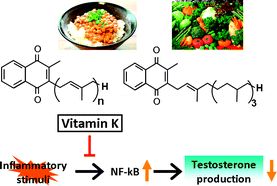Dietary vitamin K alleviates the reduction in testosterone production induced by lipopolysaccharide administration in rat testis
Abstract

* Corresponding authors
a
Laboratory of Nutrition, Graduate School of Agricultural Science, Tohoku University, Sendai, Japan
E-mail:
shirakah@biochem.tohoku.ac.jp
Fax: +81 22 717 8813
Tel: +81 22 717 8812
b Fine Chemical & Food Laboratories, J-Oil Mills, Inc., Fukuroi, Shizuoka, Japan

 Please wait while we load your content...
Something went wrong. Try again?
Please wait while we load your content...
Something went wrong. Try again?
N. Takumi, H. Shirakawa, Y. Ohsaki, A. Ito, T. Watanabe, P. E. Giriwono, T. Sato and M. Komai, Food Funct., 2011, 2, 406 DOI: 10.1039/C1FO10058K
To request permission to reproduce material from this article, please go to the Copyright Clearance Center request page.
If you are an author contributing to an RSC publication, you do not need to request permission provided correct acknowledgement is given.
If you are the author of this article, you do not need to request permission to reproduce figures and diagrams provided correct acknowledgement is given. If you want to reproduce the whole article in a third-party publication (excluding your thesis/dissertation for which permission is not required) please go to the Copyright Clearance Center request page.
Read more about how to correctly acknowledge RSC content.
 Fetching data from CrossRef.
Fetching data from CrossRef.
This may take some time to load.
Loading related content
